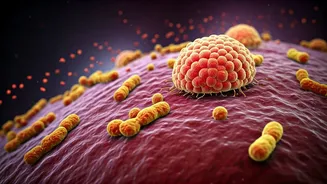Embrace a Fiber-Rich Diet
One of the most impactful changes for gut health, according to specialists, is embracing a diet rich in fiber. Fiber, found in various fruits, vegetables,
and whole grains, acts as a prebiotic, nourishing the beneficial bacteria residing in your gut. These bacteria play a vital role in digestion, nutrient absorption, and immune function. A consistent intake of fiber-rich foods helps maintain a balanced gut microbiome, which is essential for warding off inflammation. Experts recommend aiming for a daily intake of at least 25 to 30 grams of fiber. This can be achieved by incorporating a diverse range of plant-based foods into your meals, such as adding lentils, beans, berries and seeds to your daily consumption. Make it a daily ritual. Start your day with a high-fiber breakfast, and ensure that each meal includes a generous portion of fiber-rich vegetables or fruits.
Limit Processed Foods
Processed foods are often packed with additives, unhealthy fats, and refined sugars that can be detrimental to your gut health. These substances can disrupt the delicate balance of your gut microbiome, promoting the growth of harmful bacteria and increasing inflammation. Regularly consuming processed foods may contribute to various health issues, including digestive problems, weight gain, and an increased risk of chronic diseases. US specialists advise making a conscious effort to minimize your intake of processed items, such as packaged snacks, fast food, and sugary drinks. Instead, prioritize whole, unprocessed foods like fresh fruits, vegetables, lean proteins, and whole grains. Read food labels carefully and be aware of hidden sugars, sodium, and artificial ingredients. Preparing meals at home gives you greater control over the ingredients, allowing you to create gut-friendly dishes with fresh ingredients.
Stay Hydrated Daily
Water is a vital component of optimal gut health. It helps facilitate the movement of food through your digestive system, preventing constipation and ensuring proper nutrient absorption. Staying adequately hydrated also supports the production of digestive enzymes and maintains the integrity of the gut lining. Experts advise drinking plenty of water throughout the day, and the exact amount will vary based on individual factors such as activity level and climate. As a general guideline, aim for at least eight glasses of water daily. You can also supplement your hydration with herbal teas, infused water, and hydrating fruits and vegetables. Avoid excessive consumption of sugary beverages, as they can have adverse effects on gut health. Recognize the significance of hydration for your gut and make it a constant priority.
Manage Stress Effectively
Chronic stress can have a significant impact on your gut health. It can disrupt the gut microbiome, increase inflammation, and slow down digestion. Stress triggers the release of cortisol, which may negatively affect the gut lining and lead to digestive issues. US specialists emphasize the importance of managing stress levels to promote a healthy gut. Incorporate stress-reduction techniques into your daily routine, such as deep breathing exercises, meditation, yoga, or spending time in nature. Engaging in activities you enjoy, like hobbies or socializing, can also help mitigate stress. Make a conscious effort to create a balanced lifestyle that includes sufficient sleep, regular exercise, and relaxation time. Practicing mindfulness and prioritizing self-care can also help you manage stress effectively and support your gut health.
Get Adequate Sleep
Getting enough sleep is crucial for overall health, and it plays a vital role in the function of your gut. Insufficient sleep can disrupt the gut microbiome, increase inflammation, and exacerbate digestive issues. During sleep, your body performs essential repair and restorative processes, including those in the gut. Experts recommend aiming for 7 to 9 hours of quality sleep each night to support gut health. Establishing a regular sleep schedule, creating a relaxing bedtime routine, and optimizing your sleep environment can improve sleep quality. Avoid caffeine and alcohol before bed, as they can interfere with sleep. Prioritizing sleep can reduce stress, promote hormonal balance, and foster a healthy gut microbiome. Consider it an important investment in your overall well-being and health.
Consider Probiotics and Prebiotics
Probiotics and prebiotics can be valuable additions to a gut-healthy lifestyle. Probiotics are live microorganisms that promote a balanced gut microbiome, while prebiotics are non-digestible fibers that nourish the beneficial bacteria in your gut. US specialists sometimes recommend the use of probiotics, particularly if you have recently taken antibiotics or have experienced digestive issues. Probiotic supplements can help replenish the beneficial bacteria in your gut, while prebiotic-rich foods, such as garlic, onions, and bananas, can support their growth. Before starting any supplements, it is always best to consult with a healthcare professional to determine if they are suitable for your specific needs. Incorporating probiotics and prebiotics into your diet, under professional guidance, can potentially enhance your gut health and contribute to overall wellness.























